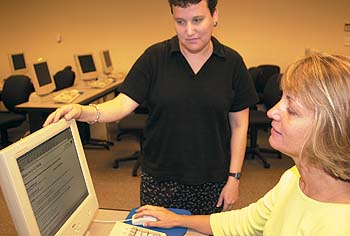|
G-Training in Progress
Beginning in the late 1980s, a series of reports closely examined the state of public health in the United States and found it lacking. Although “The Future of Public Health” (1988) found effective public health activities to be “essential to the health and well-being of the American people,” it described a field in disarray. More in-depth studies followed: “Healthy People 2010” (2000), “Who Will Keep the Public Healthy?” (2002), and “The Future of the Public’s Health in the 21st Century” (2002) looked at the roles of government and academia in public health, revealing a neglected infrastructure, strained or fragmented relationships between health care delivery systems and government public health agencies, and insufficient training of the public health workforce. The reports called for measures to shore up the flagging public health system. The need to better train the workforce was a top priority. Another common theme of the reports was a call for partnerships to accomplish public health goals. The writers recommended that public health schools partner with federal, state, and local agencies, even drawing in resources from the corporate community or the media. September 11 and the ensuing anthrax outbreaks added their own grim punctuation to the need for a well-trained and prepared public health workforce. The CDC responded by establishing a network of centers for public health preparedness to improve the competency of the front-line public health worker and the capacity to respond to current and emerging public health threats and emergencies. The Academic Center for Public Health Practice (A-CPHP), led by Associate Dean Kathleen Miner, is part of this network under the umbrella of the Center for Public Health Preparedness and Research, also located at the Rollins School of Public Health (RSPH), under the leadership of Professor Ruth Berkelman. The Emory training center collaborates closely with the Georgia Division of Public Health. One example of this partnership is G-TRAIN (Georgia Training Resource and Inventory Network), a web-based method that provides an ongoing assessment of training needs in Georgia’s public health workforce. The initiative is timely, answering the state’s mandate to assess the training needs of its public health workforce and fulfilling the Emory A-CPHP’s goal to provide education and training in bioterrorism. Although G-TRAIN initially will examine competencies in bioterrorism, “it is a flexible system that can be expanded based on Georgia’s needs,” says Melissa Alperin, coordinator and co-investigator of the Emory A-CPHP. To begin the process, G-TRAIN users complete a series of personal profiles and a competency assessment on the web. They then can search and register for courses that meet their training needs from a list of course profiles posted on the website. G-TRAIN will help Georgia identify gaps in training, develop training plans and activities, and produce reports broken down by state branches and districts. These reports may generate information on workforce composition and competency assessments, as well as learning preferences and styles of workers. The tool is intended for training and professional development, but not as a method for deploying people or for human resources supervisors, Alperin says. For that reason, only individual workers will have access to their personal information. Other states are pursuing methods of evaluating the capabilities of the local public health workforce, but according to Alperin, Georgia’s collaboration between a state agency and an academic public health preparedness center is unique. The current effort grows out of more than 15 years of close collaboration between the state and the school. Researchers from the school and practitioners from the state have worked together to prepare instructional materials, plan conferences, implement projects, and hire staff. When the Emory A-CPHP learns of potential money earmarked for public health, they consider ways to leverage those funds by collaborating with the state. Faculty from the Emory A-CPHP often participate in search committees for filling state public health positions. Workers at the state and the center attend each other’s regular meetings. When invited to important events, they bring their partners along. They usually have more than one project in the works, and currently, they are working together on a prostate cancer education project and an assessment of immunization of two-year-olds. How did the close collaboration develop? “We talk,” says Alperin. “When we’ve set out to create a new training tool, we don’t develop that in isolation. We need feedback from the state because it is for them.”
Resisting Superbugs | Foege Fellows | Cancer Collaboration | Profile: County Connections Class Notes & Alumni News | Rollins School of Public Health
Copyright © Emory University, 2003. All Rights
Reserved. |

